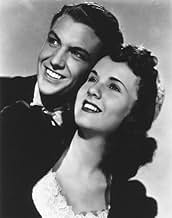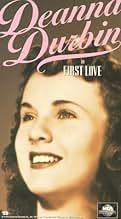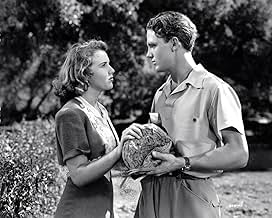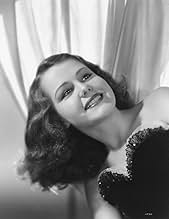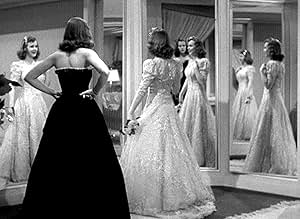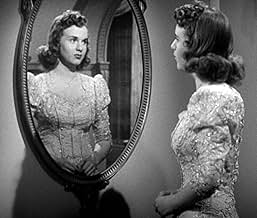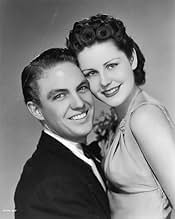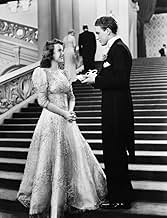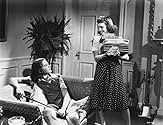PUNTUACIÓN EN IMDb
7,0/10
827
TU PUNTUACIÓN
Añade un argumento en tu idiomaAn orphaned boarding school graduate secretly attends a prestigious ball, where she falls for the boyfriend of her snobbish cousin.An orphaned boarding school graduate secretly attends a prestigious ball, where she falls for the boyfriend of her snobbish cousin.An orphaned boarding school graduate secretly attends a prestigious ball, where she falls for the boyfriend of her snobbish cousin.
- Dirección
- Guión
- Reparto principal
- Nominado para 2 premios Óscar
- 4 premios y 2 nominaciones en total
Reseñas destacadas
I'll take my Cinderella with Prokovief, but after watching First Love, a first-rate film with a quease-inducing title, I'll place this Deanna Durbin vehicle second.
"You go up there to New York," says Miss Wiggins, a crotchety, spinster music teacher, to Connie Harding, who has just graduated from a fancy private school. "Make those people love you just as much as we do." Connie is an orphan, and Miss Wiggins is referring to her uncle and his family, wealthy New Yorkers who have paid all her bills but were just too busy to drive down for her graduation. They sent one of the family's limousines for her. "And then," Miss Wiggins says, "maybe, someday, you will meet a prince, and you'll live happily ever after."
"Those fairy stories haven't come true for over 100 years, Miss Wiggins," Connie says.
Miss Wiggins thumps the floor with her cane. "Fiddlesticks! We just have to dust them off...streamline them a bit."
And this is what director Henry Koster, one of the best of Durbin's directors, has managed to do. He is aided immeasurably by a clever script ("This is terrible," says Barbara, Connie's awful cousin, "I can't be more than an hour and a half late to Wilma's party...she's one of my personal friends!") and solid, pungent performances by some very good character actors. The story's sweetness is genuine, based on the intrinsic sympathy for a young girl who manages to overcome obstacles with the help of others, and then finds happiness. Deanna Durbin at 18 is an intriguing combination of naturalness and skill. We like her the moment we see her, and her ability to win us over is enhanced when we meet the family. Her uncle (Eugene Palette) is a gruff man who seemingly only wants to keep far away from his wife and children, as well as away from Connie. When we meet the rest of the family, we sympathize with him. His wife (Leatrice Joy) is unpleasantly scatter-brained. His daughter (Helen Parish), a year older than Connie, is a snobbish, selfish, manipulating terror. His son (Lewis Howard) is so languid he make laziness seem tiring.
There's a lavish ball, and Connie gets to go thanks to the intervention of the servants, led by that great butler-playing specialist, Charles Coleman. She meets a prince of a wealthy young man, Ted Drake (whom she met once before with mud on her face). When they waltz at the ball, all the other dancers fade away in a clever bit of instant love setting by Koster. Then Durbin receives her first screen kiss, from Robert Stack as Ted, as naturally as she acts. After the usual ups and downs for Cinderella, there's a happy ending which involves a matching slipper. Her uncle becomes the worm who turns, dealing brisk and satisfying retribution to his family, and even Miss Wiggins smiles. We are assured that Connie and Ted live happily ever after.
Durbin sings two or three songs, including the hoary old tear-jerker "There's No Place Like Home." More impressively, she sings "Un Bel Di." Impressively, because not many 18-year- olds I've heard of would be able to handle the emotions Puccini lays on with such a trowel. The aria is a tear-jerker, too, but a great one. It takes a singer who knows what she's doing to handle the emotions (in Italian) as well as the notes. Durbin carries it off impressively with her usual uncanny poise.
First Love, except for that title, is completely and satisfyingly charming.
"You go up there to New York," says Miss Wiggins, a crotchety, spinster music teacher, to Connie Harding, who has just graduated from a fancy private school. "Make those people love you just as much as we do." Connie is an orphan, and Miss Wiggins is referring to her uncle and his family, wealthy New Yorkers who have paid all her bills but were just too busy to drive down for her graduation. They sent one of the family's limousines for her. "And then," Miss Wiggins says, "maybe, someday, you will meet a prince, and you'll live happily ever after."
"Those fairy stories haven't come true for over 100 years, Miss Wiggins," Connie says.
Miss Wiggins thumps the floor with her cane. "Fiddlesticks! We just have to dust them off...streamline them a bit."
And this is what director Henry Koster, one of the best of Durbin's directors, has managed to do. He is aided immeasurably by a clever script ("This is terrible," says Barbara, Connie's awful cousin, "I can't be more than an hour and a half late to Wilma's party...she's one of my personal friends!") and solid, pungent performances by some very good character actors. The story's sweetness is genuine, based on the intrinsic sympathy for a young girl who manages to overcome obstacles with the help of others, and then finds happiness. Deanna Durbin at 18 is an intriguing combination of naturalness and skill. We like her the moment we see her, and her ability to win us over is enhanced when we meet the family. Her uncle (Eugene Palette) is a gruff man who seemingly only wants to keep far away from his wife and children, as well as away from Connie. When we meet the rest of the family, we sympathize with him. His wife (Leatrice Joy) is unpleasantly scatter-brained. His daughter (Helen Parish), a year older than Connie, is a snobbish, selfish, manipulating terror. His son (Lewis Howard) is so languid he make laziness seem tiring.
There's a lavish ball, and Connie gets to go thanks to the intervention of the servants, led by that great butler-playing specialist, Charles Coleman. She meets a prince of a wealthy young man, Ted Drake (whom she met once before with mud on her face). When they waltz at the ball, all the other dancers fade away in a clever bit of instant love setting by Koster. Then Durbin receives her first screen kiss, from Robert Stack as Ted, as naturally as she acts. After the usual ups and downs for Cinderella, there's a happy ending which involves a matching slipper. Her uncle becomes the worm who turns, dealing brisk and satisfying retribution to his family, and even Miss Wiggins smiles. We are assured that Connie and Ted live happily ever after.
Durbin sings two or three songs, including the hoary old tear-jerker "There's No Place Like Home." More impressively, she sings "Un Bel Di." Impressively, because not many 18-year- olds I've heard of would be able to handle the emotions Puccini lays on with such a trowel. The aria is a tear-jerker, too, but a great one. It takes a singer who knows what she's doing to handle the emotions (in Italian) as well as the notes. Durbin carries it off impressively with her usual uncanny poise.
First Love, except for that title, is completely and satisfyingly charming.
A maturing DEANNA DURBIN and a strikingly handsome young ROBERT STACK are the enjoyable romantic leads in this Cinderella tale that spins along with a few Durbin songs tossed in for good measure.
Deanna plays the orphaned cousin of a rich and snobbish family that tries to get her to stay home from a lavish ball. With the help of servants (instead of mice), Deanna gets to attend the ball, delivers an outstanding solo, meets the handsome "prince" (Stack) and has to fend off the insults of her snobbish cousin (Helen Parrish).
The slight plot moves effortlessly toward a happy ending. Durbin fans should love this one--it's easy to take and easy to love. Eugene Pallette gives a fine comic performance as her gruff uncle and the rest of the cast does a professional job under Henry Koster's direction.
Deanna plays the orphaned cousin of a rich and snobbish family that tries to get her to stay home from a lavish ball. With the help of servants (instead of mice), Deanna gets to attend the ball, delivers an outstanding solo, meets the handsome "prince" (Stack) and has to fend off the insults of her snobbish cousin (Helen Parrish).
The slight plot moves effortlessly toward a happy ending. Durbin fans should love this one--it's easy to take and easy to love. Eugene Pallette gives a fine comic performance as her gruff uncle and the rest of the cast does a professional job under Henry Koster's direction.
This 1939 take on 'Cinderella' works like a charm, and I honestly would never have guessed as much. I found myself being continuously bewitched by it, its sincerely touching and funny script and dialogue, the wealth of small character parts from the laconic spinster teacher ("Old maids are only happy when they cry, you'll find out") and the personable servants to the zany rich family that Durbin's orphan girl has to stand up to.
And of course, over and above everything else, there is Deanna Durbin, a full-fledged young leading lady with a miraculous voice and loads of screen presence and pathos (listen to her sing 'Un bel dì' from 'Madame Butterfly' at the end!). Blonde hunk Robert Stack has his first part ever as the Prince Charming who is left with the empty slipper, but only after a gorgeous series of incredibly romantic encounters.
And of course, over and above everything else, there is Deanna Durbin, a full-fledged young leading lady with a miraculous voice and loads of screen presence and pathos (listen to her sing 'Un bel dì' from 'Madame Butterfly' at the end!). Blonde hunk Robert Stack has his first part ever as the Prince Charming who is left with the empty slipper, but only after a gorgeous series of incredibly romantic encounters.
"First Love" is a delightful 20th century Cinderella story, with good songs by Deanna Durbin and some light comedy. The film was nominated for three Academy Awards. Since most people know the Cinderella plot, a lot more need not be said. Except that a very good supporting cast does justice to a good screenplay in this modern adaptation of the story.
Durbin is Constance Harding in the Cinderella role. The prince role is Ted Drake, played by Robert Stack. There isn't a fairy godmother, a pumpkin or adaptable mice. But this Cinderella has relatives with a house and servants who take to her. And, a somewhat beleaguered and withdrawn Uncle James Clinton (played by Eugene Pallette), who eventually comes to life thanks to Constance.
When she is rejected by her cousins, Constance returns to the orphanage where she was raised. She had known family there, among all the other girls, the teachers and the director, Miss Wiggins (played by Kathleen Howard). She says she will stay there and become a teacher also. But she gets some sage counseling from Miss Wiggins.
Miss Wiggins, "Do you like cats?" Constance Harding, "No, not much." Miss Wiggins, "Huh! You'll get to love them. They've got sense. They're like men. Feed them, pet them, and admire them, and they'll purr. Every woman wants to make somebody purr. You want to lock yourself up in a world of women."
Constance notices the ladies of the faculty with tears on their faces listening to her sing a beautiful aria. She later asks Miss Wiggins about it. Wiggins says, "Old maids ore only happy when they cry. You'll find that out."
But, just as in the fairy tale, the prince charming in this film finds his Cinderella. And Ted Drake sees to it that Constance won't be among the spinster faculty at the orphanage. It's an entertaining film that the whole family should enjoy.
Durbin is Constance Harding in the Cinderella role. The prince role is Ted Drake, played by Robert Stack. There isn't a fairy godmother, a pumpkin or adaptable mice. But this Cinderella has relatives with a house and servants who take to her. And, a somewhat beleaguered and withdrawn Uncle James Clinton (played by Eugene Pallette), who eventually comes to life thanks to Constance.
When she is rejected by her cousins, Constance returns to the orphanage where she was raised. She had known family there, among all the other girls, the teachers and the director, Miss Wiggins (played by Kathleen Howard). She says she will stay there and become a teacher also. But she gets some sage counseling from Miss Wiggins.
Miss Wiggins, "Do you like cats?" Constance Harding, "No, not much." Miss Wiggins, "Huh! You'll get to love them. They've got sense. They're like men. Feed them, pet them, and admire them, and they'll purr. Every woman wants to make somebody purr. You want to lock yourself up in a world of women."
Constance notices the ladies of the faculty with tears on their faces listening to her sing a beautiful aria. She later asks Miss Wiggins about it. Wiggins says, "Old maids ore only happy when they cry. You'll find that out."
But, just as in the fairy tale, the prince charming in this film finds his Cinderella. And Ted Drake sees to it that Constance won't be among the spinster faculty at the orphanage. It's an entertaining film that the whole family should enjoy.
Deanna Durbin is the poor cousin of a rich family. She attends Kathleen Howard's girl's school with cousin Helen Parish, and gets invited to their New York mansion for Christmas break. Even though uncle Eugene Pallette seems nice enough -- what little is seen of him -- the rest of the family is a bunch of weirdos and nasties. She wants to go to the ball, but has to wear cast-off clothes. But the mansion's staff, who adore her for singing for them, club together and rent an expensive outfit. When Miss Parish orders her not to go to the ball....
Miss Durbin was Universal's biggest star, but how were they to deal with the fact that she was now 17 and could no longer be Little Miss Fix-It? Her production team, consisting of Henry Koster and Joe Pasternak decided to write her a Cinderella story, with newly-hired Robert Stack as Prince Charming. Of course there are musical interludes, an old-fashioned ballad or two, and a selection of opera arias. The writing team kept everything familiar, including borrowing liberally from My Man Godfrey to make sure that Miss Durbin's fans wouldn't be too outraged.
Miss Durbin was Universal's biggest star, but how were they to deal with the fact that she was now 17 and could no longer be Little Miss Fix-It? Her production team, consisting of Henry Koster and Joe Pasternak decided to write her a Cinderella story, with newly-hired Robert Stack as Prince Charming. Of course there are musical interludes, an old-fashioned ballad or two, and a selection of opera arias. The writing team kept everything familiar, including borrowing liberally from My Man Godfrey to make sure that Miss Durbin's fans wouldn't be too outraged.
¿Sabías que...?
- CuriosidadesDeanna Durbin's character gives her birthdate as 4 December - Durbin's own.
- PifiasThe movement of Deanna during the scene with her mirror.
- Citas
Miss Wiggins: The trouble with you young people is you don't believe in anything. You're afraid, afraid of hope, afraid of happiness.
- ConexionesFeatured in Lazos eternos (1943)
Selecciones populares
Inicia sesión para calificar y añadir a tu lista para recibir recomendaciones personalizadas
- How long is First Love?Con tecnología de Alexa
Detalles
- Duración
- 1h 24min(84 min)
- Color
- Relación de aspecto
- 1.37 : 1
Contribuir a esta página
Sugerir un cambio o añadir el contenido que falta

